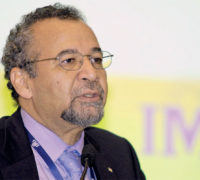
How ChatGPT can unchain you from mundane office life
GenAI will allow human talent to focus on more creative, complex tasks, leading to greater job satisfaction and well-being....
Audio available

by Hischam El-Agamy Published 16 January 2023 in Magazine • 9 min read • 
We live in a world of rapid transformation, a world where digital disruption and megatrends are affecting all industries. Successful family businesses are those that are willing to move away from traditional opportunities and react quickly and decisively to change.
The story of Obeikan’s success began in 1982 with a single commercial print shop in Riyadh.
Over the next 40 years, OIG diversified into new industries and markets and now has a diverse set of operations in manufacturing, packaging, education, and healthcare. It is one of the leading business groups in the Middle East and North Africa and one of Saudi Arabia’s top 100 largest companies, serving more than 80 markets globally.
Since 2017, the company has increased its focus on digital transformation, supported by more than 3,000 staff whose ways of working have been transformed by a digital environment and the solutions the group has adopted.
Al-Obeikan, who has been at the helm of the business since 2002, was quick to take advantage of the digital opportunities he saw evolving in the world around him.
“For me, harnessing the power of digital was not a choice – it was a business imperative. “Since our inception, a strategic enabler of this business has been to constantly seek out opportunities to drive growth and improve productivity,” he said.
Early on, Al-Obeikan recognized the role technology could play in creating more productive, precise, and responsive manufacturing operations.
“I was inspired by what I saw in the emerging B2C companies of the late 2000s, the likes of Uber and Airbnb,” he explained. “These are companies that have completely changed the world and I saw the potential that digital technologies could unlock in the B2B space.”
He notes that B2B companies face similar problems to those that innovative B2C companies set out to solve, such as waste, redundancy, or poor customer experience.
“With cost and competition increasing, I realized that digitization was not just a tool but a competitive advantage,” he added.
Al-Obeikan realized that a strategic focus on digitization was about more than improving productivity, it was also about meeting the growing expectations of OIG’s customers and employees. He realized they were experiencing a far more personalized and accessible experience as consumers and knew they would come to expect this in their working lives as well.
“If you order a pizza, you can now see exactly where it is every step of the way. But this was not the experience my customer was getting when waiting for a product, or my employee experienced while waiting for a spare part. I realized we needed to give them the same experience they were receiving as consumers by communicating with them regularly and on the platforms that they preferred – that is, on their mobile devices,” he said.
In 2017, OIG embarked on a journey to create a digital enterprise. This involves data scientists working hand-in-hand with experts in the field to ensure that all processes are digitized, unlocking the knowledge within the business to create digital assets of the company’s physical assets.
Today, at OIG’s 20 factories, digital technologies provide end-to-end connectivity across all machines in the facility. Data from these machines is analyzed to contribute to the artificial intelligence and advanced analytics that drive continuous improvement in machine and production efficiencies. Smart equipment raises maintenance tickets automatically and there is real-time machine healthcheck reporting and production target tracking.

The success of the company’s digital transformation is measured in improvements in productivity, quality, customer experience, and employee engagement.
“We don’t measure our success by the flashy screens we have on the shop floor, we measure our success by real money on the bottom line,” said Al-Obeikan.
“Through smart manufacturing, we have moved from a world where people manage machines to where machines, data, and analytics enable us to improve our productivity and experience continuous improvement. We have transformed our supply chain, and we are able to make decisions quickly across the entire spectrum of our operations, which is greatly improving customer experience.”
He is also on a mission to create a truly “autonomous enterprise”. The group uses AI for almost everything, from budgeting and cashflow to understanding its engagement with people. Job descriptions are generated automatically. And the company has also developed a sophisticated knowledge center where lessons are learned from performance issues by simulating the operations involved. It acts as a useful training tool to improve staff performance.
Human capital management is also automated, from talent acquisition to retirement. The group is even automating succession planning by identifying suitable candidates based on clear competencies and experiences. The system then automatically generates the ideal learning path. All these processes happen digitally without human intervention, in addition to leveraging AI to predict the organization’s dynamic and future behaviors.
“This will enable the organization to drive even faster,” said Al-Obeikan. “Today we have self-drive cars and self-drive planes, so there is no reason why we can’t have autonomous enterprises too, even if this is hard for some to accept.”
Al-Obeikan admits the journey is not without its challenges. But he is clear that, for companies embarking on a digital transformation journey, it’s important to understand that the key to getting it right is not so much the availability of digital talent, but rather an organizational issue. He believes having the right people with a deep understanding of the processes within an organization is essential.
“Many people talk about a lack of data scientists and coders as being a hindrance to digital transformation. However, it is not that,” he explained. “The big technology companies have put the tools in place to make that aspect of transforming your business so much cheaper, easier, and faster.
“What you need to do is focus on harnessing the knowledge of your subject matter experts, the people that understand your business, your customer, and your supplier. Digitization involves cementing their knowledge so that if they leave, you don’t lose it.
“In short, you need to get organized, understand all your verticals, connect all your assets, and then optimize them using machine learning. If this backbone of your business is not in order, you won’t be able to move forward.”
What’s more, he emphasizes that digital transformation must come from the top.
“The CEO has to lead the transformation. If the CEO, from an intellectual point of view, doesn’t have a deep understanding of what digital opportunity is, the threat is that you won’t digitize. As CEO, you need to be persistent and decisive about digital. You have to repeatedly deliver the message that digital is the strategy. Yes, you need to give people a chance to learn and to adapt — but if they don’t, then you must make the tough decision of letting them go.”
We don’t measure our success by the flashy screens we have on the shop floor, we measure our success by real money on the bottom line
Part of this learning for Al-Obeikan is training people in the practice of design thinking, the process of solving problems by prioritizing the customer’s needs above all else.
“After three years of hard work I now have the majority of my employees across the threshold,” he said. “There is no more debate in the company about the direction, or why we are doing this, or how we can win by using digital tools. Today, all questions have been answered, there is no doubt.”
Another challenge is how companies should scale transformation.
“Many companies can transform on a small scale, but it’s when they try to do it for the whole enterprise that they fail. There are a number of reasons for this from lack of connectivity of assets to a lack of deep process knowledge.”
Al-Obeikan’s commitment to harnessing the benefits of digital extends beyond OIG. Through the creation of a smart manufacturing platform and innovation hub, he is bringing the benefits of a digital enterprise to customers, partners, and companies across the Kingdom of Saudi Arabia and beyond.
OIG no longer sees itself as a product provider but as a solutions provider. It offers companies digital tools to simulate their operations before implementing them.
“Since the beginning of our transformation journey, we have been on a mission to give back to our country’s industrial business ecosystem,” said Al-Obeikan. “Through our innovative digital solutions, backed by world-renowned technologies, we are enabling them to be ready for a different tomorrow.”

“Through smart manufacturing, we have moved from a world where people manage machines to where machines, data, and analytics enable us to improve our productivity and experience continuous improvement”
OIG is building software-as-a-service (SaaS) models for everything it does and has so far built more than 20 use cases. “We validate everything on our own shop floor. We identify the required data and once we have tried and tested it, we share our domain expertise with the market. Data scientists work hand-in-hand with subject matter experts to achieve this.”
Al-Obeikan says that being able to show companies digital transformation in action is incredibly useful.
“I meet two to three CEOs a week. It’s one thing to listen to a lecture, read a book, or go to a workshop on digital transformation, but another to see it happening with your own eyes. We bring people to see what we are doing in our operations at our Obeikan Knowledge Academy, which works as a research and development hub for Obeikan Group.
You have to repeatedly deliver the message that digital is the strategy. Yes, you need to give people a chance to learn and to adapt — but if they don’t, then you must make the tough decision of letting them go
“We understand the pain of manufacturers. We have four decades of experience in producing products. Everyone in our value chain is involved in building our platform, from forklift drivers to the CFO. All my employees are responsible for challenging the platform, for dealing with bugs, and this has enabled us to mature at a rapid pace.”
Al-Obeikan said the success of his company’s digital transformation can be traced back to its entrepreneurial roots. “For us, it was easy to adopt the Silicon Valley approach in our business, that is to start small, scale fast, or fail fast,” he said.
What the company’s rapid digital transformation makes clear is that family businesses have the innate ability to self-innovate and create competitive advantage thanks to their entrepreneurial spirit and desire to build a lasting legacy. With the pace of technological change, the opportunities are enormous – provided businesses equip themselves to face the future.

IMD Executive Director, Middle East, Africa and Turkey
As Executive Director of IMD, Hischam El Agamy is responsible for IMD’s activities in Africa, the Middle East, and South-Central Asia, where he teaches and leads development programs. El Agamy’s expertise and teaching experience include scenario planning, business transformation, family business transformation, public-private partnership, and stakeholder engagement. He teaches regularly in IMD custom programs and has taught several IMD open programs, including its EMBA and MBA programs.
For over 14 years, El Agamy has occupied various international functions in seven European countries as part of a long career with major Swiss multinational corporations in Zürich. During these years, he has driven a number of business transformation initiatives in several European countries.
He has contributed to several advisory assignments for governments in the Gulf region and in the area of competitiveness and human capital development for the government of South Africa.
El Agamy obtained two master’s degrees in applied science from the University of Fribourg and Lausanne in Switzerland. He received his Doctorate from the University of Pierre & Marie Curie in Paris.

18 April 2024 • by Quentin Gallea in Audio articles
GenAI will allow human talent to focus on more creative, complex tasks, leading to greater job satisfaction and well-being....
 Audio available
Audio available
15 April 2024 • by Annabelle Gawer in Audio articles
AI-as-a-Service will impact executives and their strategic decisions. It’s crucial to assess the benefits and repercussions it will bring....
 Audio available
Audio available
9 April 2024 in Audio articles
When the going gets tough, the behavior and decisions of board members can heavily influence the fate of companies and have far-reaching repercussions. When the going gets tough, the behavior...
 Audio available
Audio available
8 April 2024 • by Konstantinos Trantopoulos in Audio articles
Businesses can retain customers, attract new ones or shape their preferences by aligning key game design elements with strategic objectives....
 Audio available
Audio availableExplore first person business intelligence from top minds curated for a global executive audience